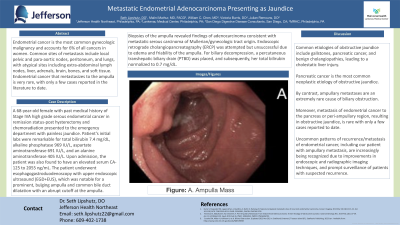Tuesday Poster Session
Category: Biliary/Pancreas
P2911 - Metastatic Endometrial Adenocarcinoma Presenting as Jaundice
Tuesday, October 24, 2023
10:30 AM - 4:00 PM PT
Location: Exhibit Hall

Has Audio

Seth Lipshutz, DO
Jefferson Health Northeast
Philadelphia, PA
Presenting Author(s)
Seth Lipshutz, DO1, Malini Mathur, MD, FACG2, William C. Chen, MD3, Victoria Burris, DO4, Julian Remouns, DO2
1Jefferson Health Northeast, Philadelphia, PA; 2Lankenau Medical Center, Philadelphia, PA; 3San Diego Digestive Disease Consultants, San Diego, CA; 4MRHC, Philadelphia, PA
Introduction: Endometrial cancer is the most common gynecologic malignancy, and accounts for 6% of all cancers in women. Common sites of metastasis include local pelvic and para-aortic nodes, peritoneum, and lungs, with atypical sites including extra-abdominal lymph nodes, liver, adrenals, brain, bones, and soft tissue. Endometrial cancer that metastasizes to the ampulla is very rare, with only a few cases reported in the literature to date.
Case Description/Methods: A 68-year-old female with past medical history of Stage IVA High Grade Serous Endometrial Cancer status post hysterectomy and chemoradiation in remission, presented to the emergency department with painless jaundice. Patient’s initial labs were remarkable for total bilirubin 7.4, alkaline phosphatase 969, aspartate aminotransferase 691, and an alanine aminotransferase 405. Upon admission, the patient was also found to have an elevated serum CA-125 to 2055. The patient underwent esophagogastroduodenoscopy with upper endoscopic ultrasound (EGD/EUS), which was notable for a prominent, bulging ampulla and common bile duct dilatation with an abrupt cutoff at the ampulla. Biopsies of the ampulla revealed findings of adenocarcinoma consistent with metastatic serous carcinoma of Mullerian/gynecologic tract origin. Endoscopic retrograde cholangiopancreatography (ERCP) was attempted but unsuccessful due to edema and friability of the ampulla. For biliary decompression, a percutaneous transhepatic biliary drain (PTBD) was placed, and subsequently, her total bilirubin normalized to 0.7.
Discussion: Common etiologies of obstructive jaundice include gallstones, pancreatic cancer, and benign cholangiopathies, leading to a cholestatic liver injury. Pancreatic cancer is the most common neoplastic etiology of obstructive jaundice. By contrast, ampullary metastases are an extremely rare cause of biliary obstruction. Metastasis of endometrial cancer to the pancreas or peri-ampullary region, resulting in obstructive jaundice, is even more infrequent with only a few cases reported to date. Uncommon patterns of recurrence/metastasis of endometrial cancer, including our patient with ampullary metastasis, are increasingly being recognized due to improvements in endoscopic and radiographic imaging techniques, and prompt surveillance of patients with suspected recurrence.

Disclosures:
Seth Lipshutz, DO1, Malini Mathur, MD, FACG2, William C. Chen, MD3, Victoria Burris, DO4, Julian Remouns, DO2. P2911 - Metastatic Endometrial Adenocarcinoma Presenting as Jaundice, ACG 2023 Annual Scientific Meeting Abstracts. Vancouver, BC, Canada: American College of Gastroenterology.
1Jefferson Health Northeast, Philadelphia, PA; 2Lankenau Medical Center, Philadelphia, PA; 3San Diego Digestive Disease Consultants, San Diego, CA; 4MRHC, Philadelphia, PA
Introduction: Endometrial cancer is the most common gynecologic malignancy, and accounts for 6% of all cancers in women. Common sites of metastasis include local pelvic and para-aortic nodes, peritoneum, and lungs, with atypical sites including extra-abdominal lymph nodes, liver, adrenals, brain, bones, and soft tissue. Endometrial cancer that metastasizes to the ampulla is very rare, with only a few cases reported in the literature to date.
Case Description/Methods: A 68-year-old female with past medical history of Stage IVA High Grade Serous Endometrial Cancer status post hysterectomy and chemoradiation in remission, presented to the emergency department with painless jaundice. Patient’s initial labs were remarkable for total bilirubin 7.4, alkaline phosphatase 969, aspartate aminotransferase 691, and an alanine aminotransferase 405. Upon admission, the patient was also found to have an elevated serum CA-125 to 2055. The patient underwent esophagogastroduodenoscopy with upper endoscopic ultrasound (EGD/EUS), which was notable for a prominent, bulging ampulla and common bile duct dilatation with an abrupt cutoff at the ampulla. Biopsies of the ampulla revealed findings of adenocarcinoma consistent with metastatic serous carcinoma of Mullerian/gynecologic tract origin. Endoscopic retrograde cholangiopancreatography (ERCP) was attempted but unsuccessful due to edema and friability of the ampulla. For biliary decompression, a percutaneous transhepatic biliary drain (PTBD) was placed, and subsequently, her total bilirubin normalized to 0.7.
Discussion: Common etiologies of obstructive jaundice include gallstones, pancreatic cancer, and benign cholangiopathies, leading to a cholestatic liver injury. Pancreatic cancer is the most common neoplastic etiology of obstructive jaundice. By contrast, ampullary metastases are an extremely rare cause of biliary obstruction. Metastasis of endometrial cancer to the pancreas or peri-ampullary region, resulting in obstructive jaundice, is even more infrequent with only a few cases reported to date. Uncommon patterns of recurrence/metastasis of endometrial cancer, including our patient with ampullary metastasis, are increasingly being recognized due to improvements in endoscopic and radiographic imaging techniques, and prompt surveillance of patients with suspected recurrence.

Figure: A. Ampulla Mass
Disclosures:
Seth Lipshutz indicated no relevant financial relationships.
Malini Mathur indicated no relevant financial relationships.
William Chen indicated no relevant financial relationships.
Victoria Burris indicated no relevant financial relationships.
Julian Remouns indicated no relevant financial relationships.
Seth Lipshutz, DO1, Malini Mathur, MD, FACG2, William C. Chen, MD3, Victoria Burris, DO4, Julian Remouns, DO2. P2911 - Metastatic Endometrial Adenocarcinoma Presenting as Jaundice, ACG 2023 Annual Scientific Meeting Abstracts. Vancouver, BC, Canada: American College of Gastroenterology.
